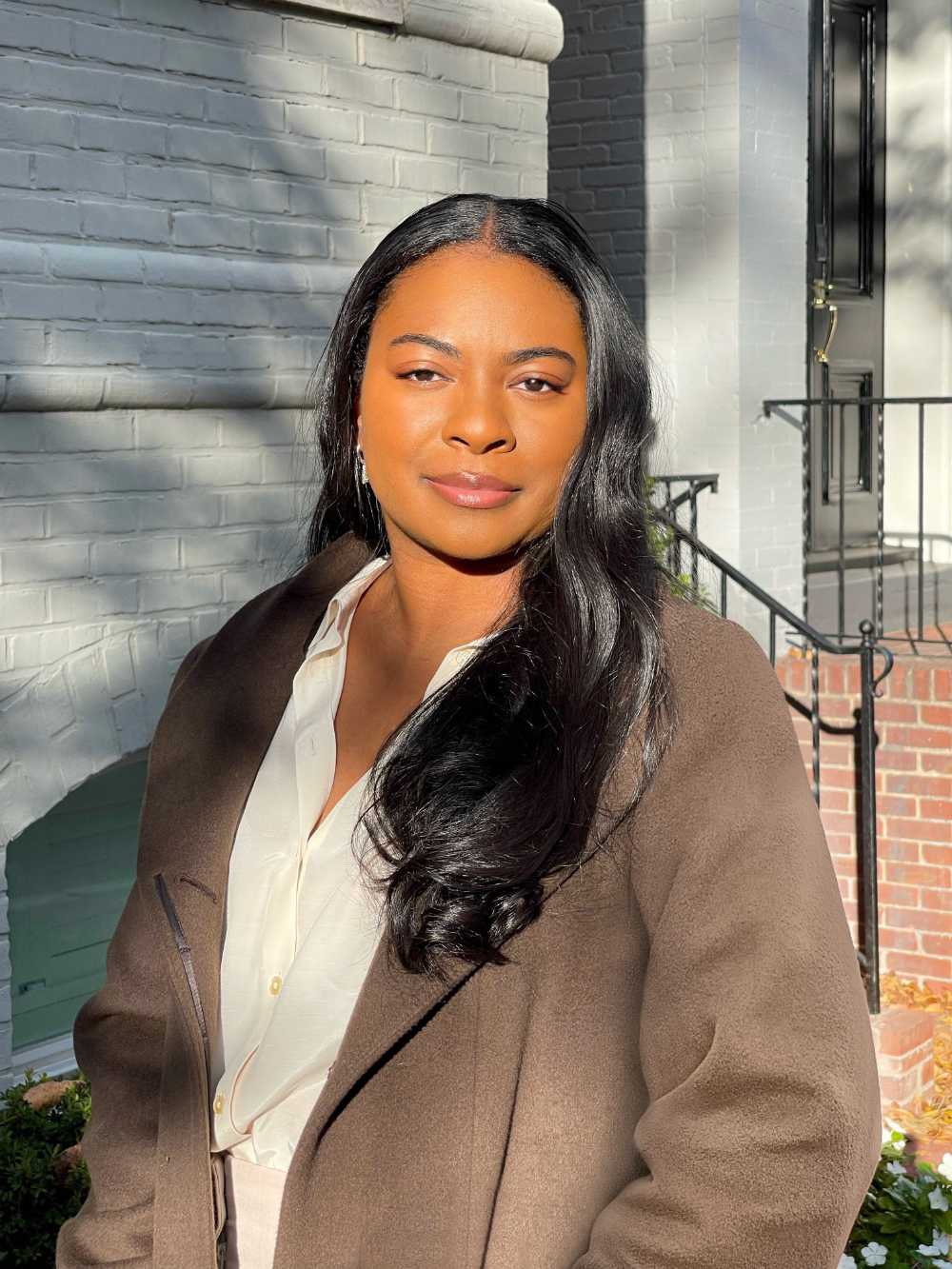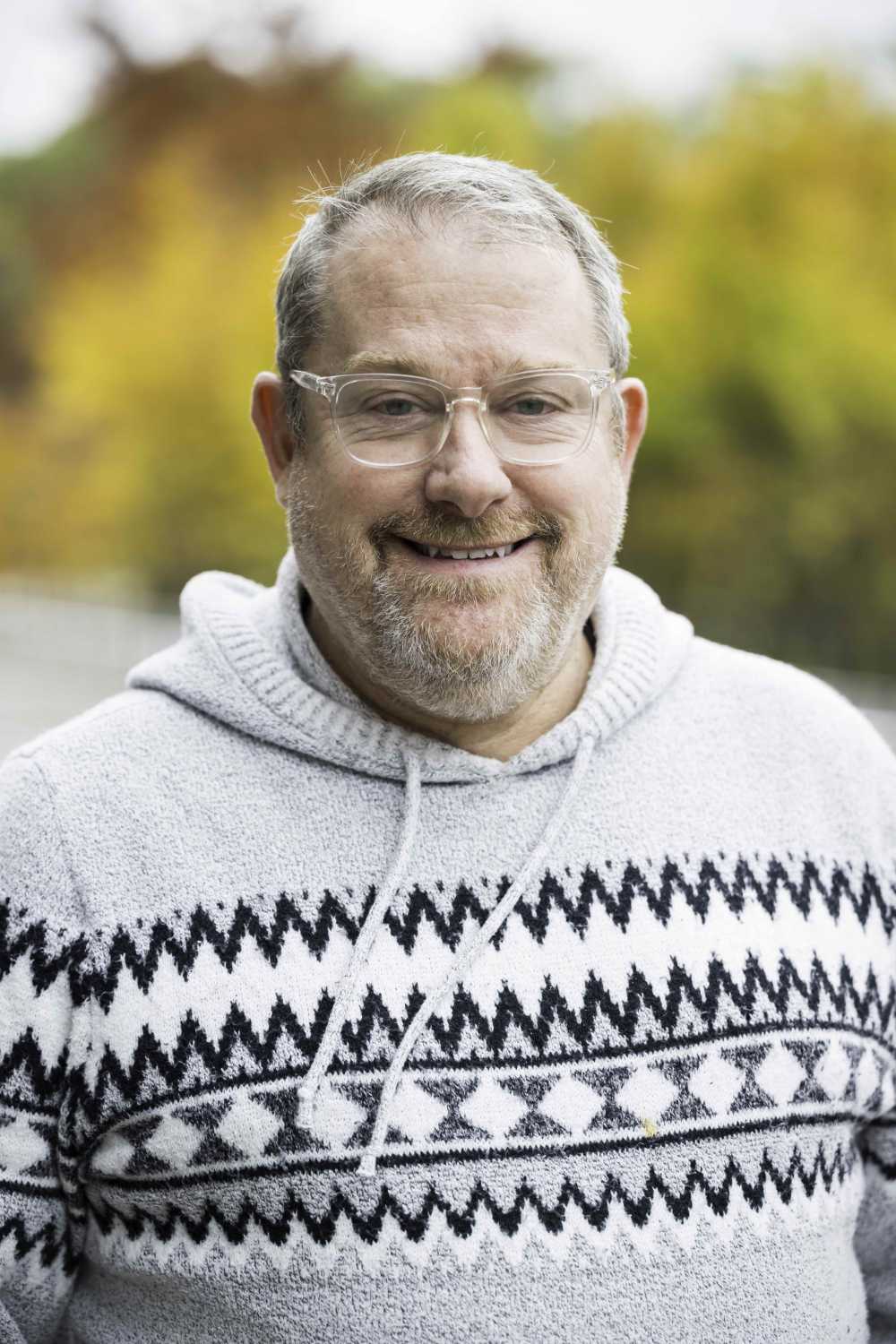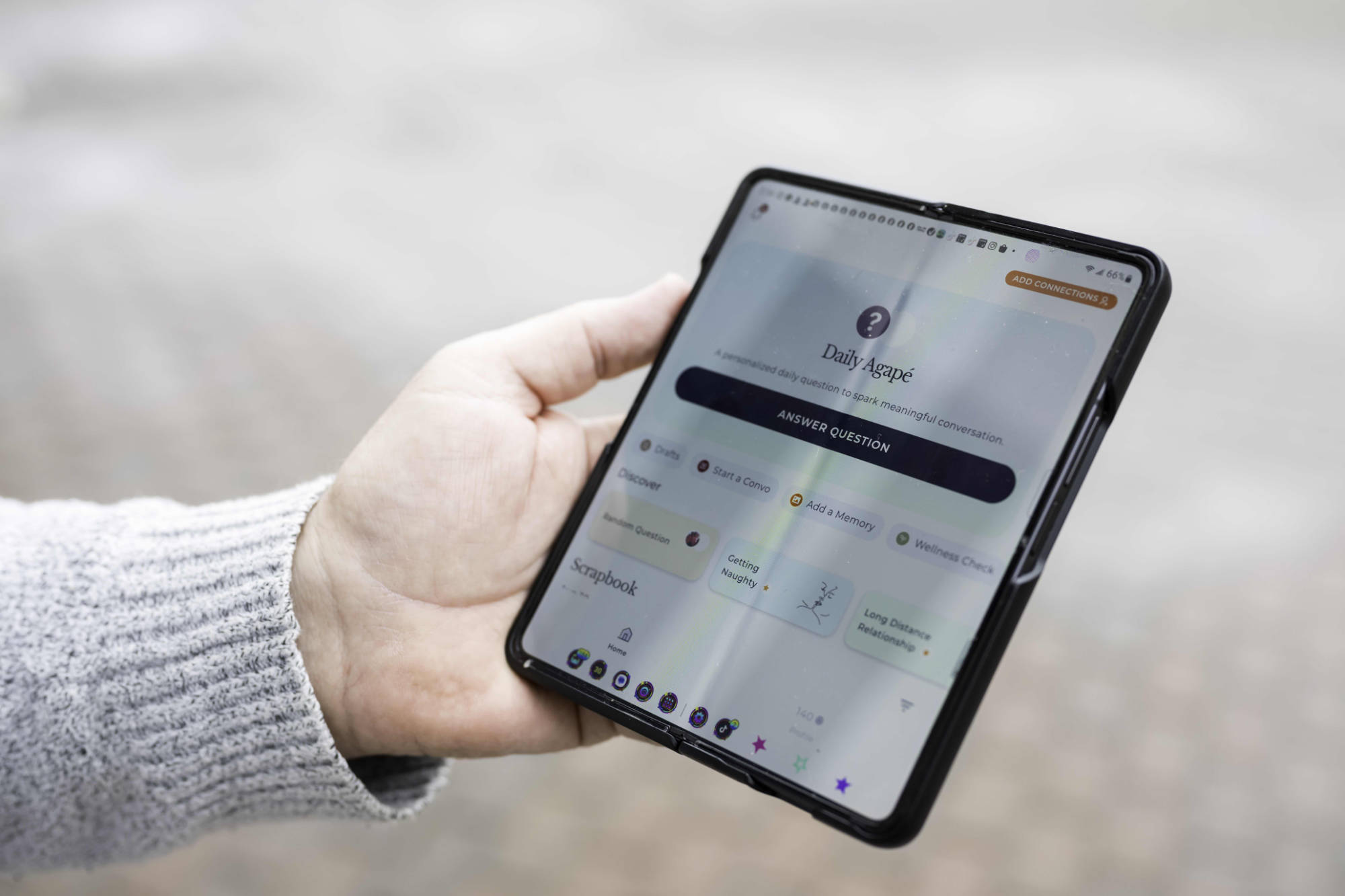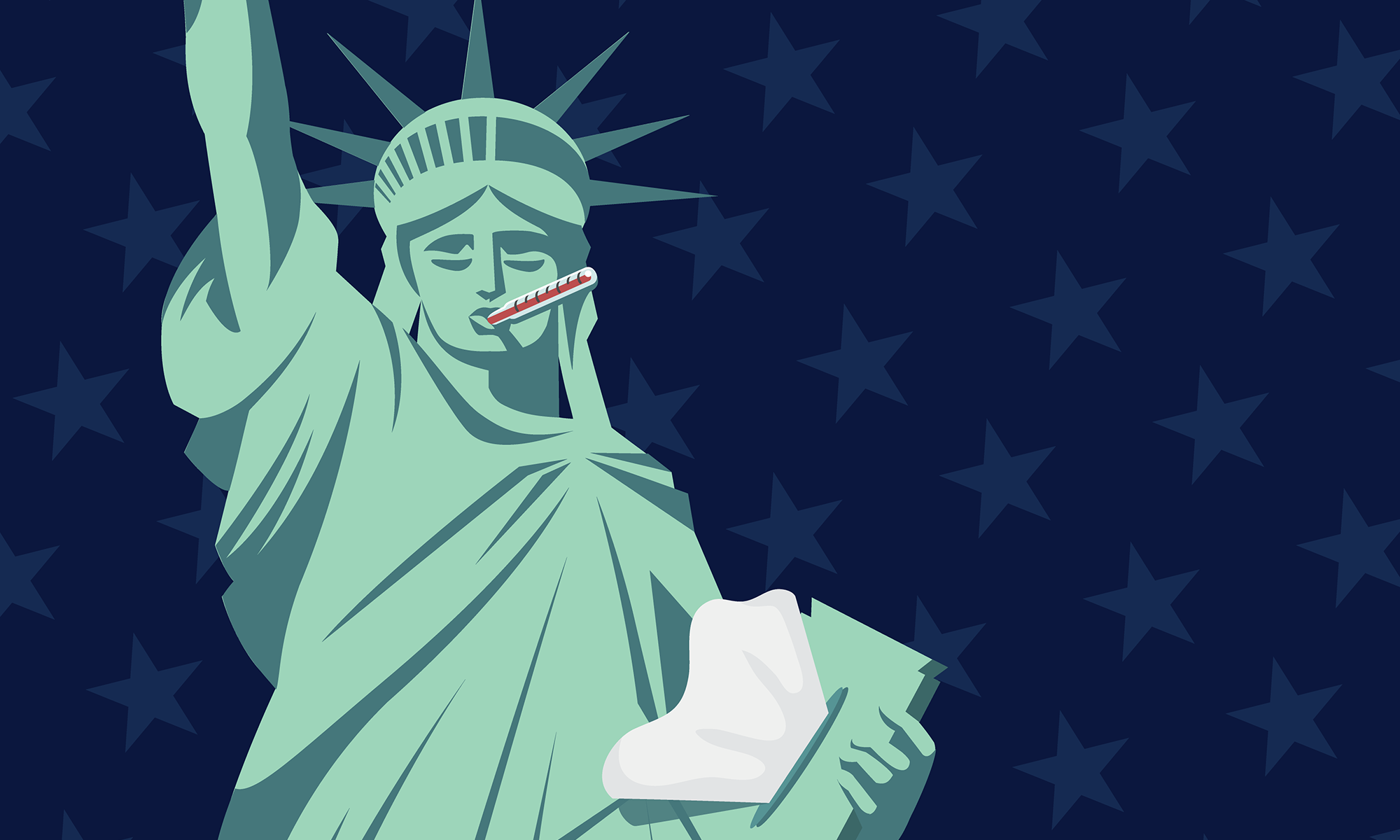Couples report healthier, stronger relationships after one month of using a relationship app codeveloped by a Rochester psychologist.
Half of all marriages in the United States are likely to fail by the time the spouses reach their 50s. Understandably, many couples are looking for ways to avoid becoming part of that statistic, well aware of a divorce’s possible wide-reaching detrimental effects on families, children, personal finances, individual well-being—and direct and indirect costs to society.
Ronald Rogge, an associate professor of psychology at the University of Rochester, has been with his partner for 15 years, the last four of them happily married.
But that’s not what makes him an expert on marriage. What does are his decades of research into the complex dynamics of romantic relationships and families. For the last 28 years, Rogge has focused his research on relationships and the early years of marriage, while searching for ways to help couples nurture and strengthen their love.

One of those ways—his newest and “most successful project, based on its extensive reach,” Rogge says—is a relationship app that he codeveloped with a former University of Rochester student. In a recent pilot study, published in the Journal of Family Psychology, Rogge found that the overwhelming majority of study participants—8 out of 10—reported improved and healthier relationships after one month of app usage.
“Our primary goal was to create an app that couples would intrinsically enjoy using, which would naturally grow in popularity, and thereby organically extend its reach,” says Rogge.
The relationship wellness smartphone app is the brain child of Khadesha Okwudili, who studied epidemiology and neuroscience as an undergraduate at Rochester. Barely in her twenties, she was diagnosed with a life-threatening heart arrythmia disorder, which has a mortality rate of up to 50 percent. At first, she wasn’t responding well to treatment. “That inspired me to ask more meaningful questions of the people I loved, because I wasn’t sure how much time I would have left with them,” Okwudili recalls. “Over time, I realized that although my health was deteriorating, my relationships started thriving in a way that they hadn’t before.”
In 2019, with her health finally stabilized, she wondered why it had taken several near-death experiences to arrive at meaningful conversations and how best to share her own epiphany with others.
“I thought, perhaps, if there was a way to encourage people to answer these types of questions with the people they loved, they could see the same benefits that I did—without having to go through something so traumatic,” says Okwudili.
Together with Rogge, she began to develop and test content for Agapé, generating thousands of questions that would be relevant for a wide range of couples.
Today, Okwudili is the founder and CEO of Agapé Wellness Inc., with Rogge as the startup’s chief research officer. Launched in early 2021 via the Google and Apple app stores, their app went viral after a user created a slick TikTok video, which resulted in a whopping 160,000 plus installs overnight. To date, the app has had more than two million users.

How does the Agapé relationship app work?
Agapé sends registered couples a daily prompt, such as “What’s something that your partner did in the past week that made you laugh?” or “Describe a time you were thankful to have your partner by your side” or “If your partner had a theme song that would play around them as they went through their day, what would it be and why?” Or something more outlandish, such as: “What unique skills would your partner bring to surviving a zombie apocalypse?”
Once both partners have answered the prompt, they can see each other’s responses, possibly sparking a meaningful conversation, “enhancing awareness” and promoting “moments of connection,” says Rogge, who has pilot tested over 4,000 prompts over the last four years, grounded in marital and couples research of the last 40 years.
In developing the app, the team prioritized the user experience and focused at every decision point on deepening that experience, says Rogge. “We listened to users. Essentially, it had to be fun and easy to use.”
But can a happier, healthier, and stronger relationship really be achieved by simply answering daily prompts from a relationship app?
How effective is the app? A scientific test
Study findings at a glance
- 80 percent reported improved romantic relationships, including a decrease in perceived negative relationship qualities and an increase in relationship satisfaction and dedication.
- 70 percent saw improvements in their own well-being, such as reporting higher vitality and a better quality of life.
- Couples who completed more daily prompts had stronger gains in relationship quality.
- 93 percent said the app was enjoyable, and 74 percent said it was easy to use.
Three years after its inception, the team—consisting of Rogge, Okwudili, and Jenna Macri ’20 (who graduated with a double major in psychology and brain and cognitive sciences from the University and is now a senior research assistant at Agapé)—subjected the app to scientific testing.
For the recent pilot study, the researchers recruited 405 romantic couples. Ninety-one percent were heterosexual and the vast majority—84 percent—in their twenties and thirties. The couples had been in their current relationships for an average of 4.6 years. While most couples in the study—31 percent of whom were married—were reasonably satisfied with their relationships, roughly a third were notably not.
The team followed the participants over the course of one month on the app, during which the couples completed baseline assessments at the start, shorter weekly wellness checks within the app, and again an assessment at the end of the month. Engagement remained high throughout, with 99 percent of couples using the app, and 88 percent providing follow-up data.
‘Connecting with others is a fundamental psychological need’
The vast majority of study participants (80 percent) saw their relationships becoming happier over the month of using the app. “That translated to a significant decrease in their reports of perceived negative relationship qualities and an increase in relationship satisfaction and dedication,” says Rogge.
Just as important were the effects on well-being, says Rogge, with 70 percent of respondents reporting feeling better. That was echoed in noticeable drops in people’s depressive symptoms and corresponding increases in vitality and a better quality of life.
“We found that regular app use really mattered. Couples who completed more daily prompts had stronger gains in their relationships,” he says.
Rogge notes that the team’s efforts to engage users worked well: 93 percent said the app was enjoyable, and 74 percent found it easy to use, “which we think increases the likelihood that couples will make the app a daily habit.”
A wide range of interventions to make relationships last have been developed over the past half century; however, research has shown that practical barriers, such as the need for trained facilitators, have resulted in limited dissemination. Other self-directed interventions, while cheap and practical, are often hampered in their reach and effectiveness by low levels of engagement, with couples completing only a small fraction of the requirements.

Although the present study focuses on romantic relationships, the app can also be used to help you feel close to your friends or family, says Rogge. The fundamental principles that underpin couples’ ties generalize to other kinds of close relationships. “We know that using the app not only benefits your relationship but also your own well-being,” Rogge says. “Using the app with more people in your life is likely to have even stronger individual benefits because we know that connecting with others is a fundamental psychological need.” And that will be one of their next studies, he says. Already the app allows for use with friends and family members.
Reaching—and helping—millions of couples
In the news
The New York Times wrote about Rogge’s romantic comedy study—Movie Date Night Can Double as Therapy.
Australian Men’s Health cited Rogge’s study about how to navigate an open relationship: The Key Is Communications and Consent.
The Independent covered Rogge’s research tool “partner-focused go/no-go association task,” which can predict break-ups a year in advance—Uncover Your Relationship Subconscious to Avoid a Break-up.
In 2013, Rogge and fellow researchers had piloted another successful home therapy that showed that couples who watched romantic comedies or dramas together—such as As Good as It Gets, Indecent Proposal, Funny Girl, or Mr. and Mrs. Smith—and discussed them afterward, had stronger and longer-lasting relationships.
While effective, the strategy did not become widely used. “Couples seemed to have a hard time to set aside two or three hours to watch a movie and then discuss it,” says Rogge. “The app project is exciting because it helps my research get into the hands of millions of couples and, I hope, will actually improve their lives,” says Rogge.
For Okwudili the app remains personal. By taking the initiative to ask deeper questions, she found that “I could be a better partner, I could be a better friend, I could be a better daughter—because I understood how the people closest to me felt about things much more deeply.”
Because Rogge and Okwudili are both stockholders in Agapé Wellness Inc., the study was conducted under a conflict-of-interest plan with the University of Rochester. The study’s data and materials can be accessed at the Open Science Framework.
Read more
 Divorce rate halved for couples who discussed relationship movies
Divorce rate halved for couples who discussed relationship movies
A study led by Ronald Rogge finds that watching and discussing movies about relationships is as effective in lowering divorce rates as more intensive early marriage counseling programs.
 What’s the secret ingredient that makes a happy couple or family?
What’s the secret ingredient that makes a happy couple or family?
Analysis shows those who are psychologically flexible have better romantic and family relationships.
 Looking for a match made in heaven—or online? Science says stay grounded
Looking for a match made in heaven—or online? Science says stay grounded
University of Rochester psychologist Harry Reis discusses how to find and foster love, including how to get the most out of online dating.




